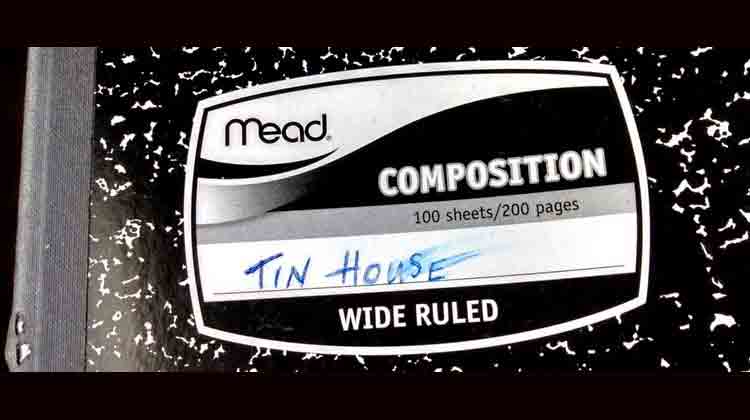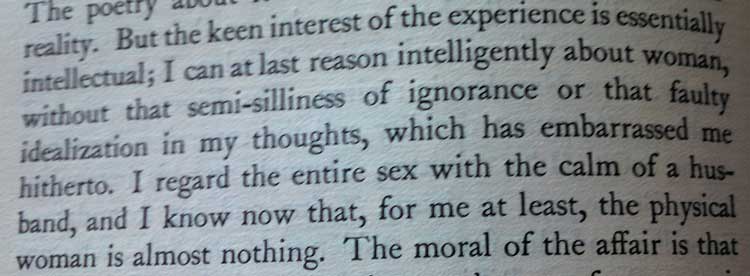
About a week before his fortieth birthday, virgin poet Henri Frederic Amiel (1821-1881) recorded in his journal that he had “received a woman’s favors” at last. His world was not rocked. “Frankly, compared to what the imagination assumes or expects, they are a small matter,” Amiel sniffed.
But the deeply religious Amiel did not give up on lust – or on spirituality. All his life, he teetered between the carnal and the transcendent, unable to pick a game and stick with it. Amiel chronicled his private anguish in the journal, not published or even known about until his death.
Like Amiel, I think a lot about sex and the body lately. This is not what sex and the body want done with them.
On the flight out of Atlanta, I am transfixed by a book on “incarnational” art, in which “statement does not carry the day, but idea enfleshed, as it were. Being impregnates, creating understanding and sympathy (in, through, and by means of which love flows).” The body divine, electric. With such a concept, Amiel might have squared a few things away. Me, too.
I study up, an aged literary striver with chronic lumbar pain, about to enter the world of spry, keen-eyed belletrists – about, that is, to join a sequestered pack of earnest people at Reed College who aim to become accomplished writers, and who still have time left in their lives for it to happen. In ordinary life, I’m a twice-divorced father of three grown kids, a biotechnology journalist who tracks the daily news of DNA and disease, problems of incarnation. This weekend, I’m en route to my first-ever, week-long, away-from-home serious writing camp.
The captain turns off the seatbelt light. In a day or two I will find myself wondering if The Captain Lands in Paradise, the book of poems by Sarah Manguso, had any influence on the title of the latest poetry collection by Nick Flynn, our workshop leader in creative nonfiction. Flynn’s book is The Captain Asks for a Show of Hands. My favorite poem in it is “Self-Exam (My Body Is a Cage).” During the workshop Flynn will praise Manguso’s memoir, Two Kinds of Decay, about a mysterious disease that overtakes her at age 21. Along with sex and the body – the cage of the body – I think a lot about decay.
The captain lands us in Portland.
Heat-wave warnings have quashed my hope for relief from the Atlanta swelter, a little Portland vacation. Tin House organizers point out that there’s no AC in the dormsat Reed where most of the attendees are to lodge. Sunday night, I find a room at the Ramada East, out by the freeway. After workshop hours, I want to work, and hope to tie up an essay that’s been refusing me for months. The Gun Piece.
Within a block of the hotel on Stark Street a pair of strip clubs beckon – neither, disappointingly, called Stark Naked. The Mystic looks upscale with fancy signage. Directly across the road waits the homier Club 205. Over the course of the week, cab drivers will inform me – weightedly in each instance, as if touting the city’s achievement – that Portland has more strip clubs per capita than any city in the country. Unanimously, they recommend Club 205.
Under a thin blanket on the crackly bed, I think of my girlfriend back home. She wedges a chair under the front doorknob, locks the bedroom, and tries not to drink, easier when I’m gone. “In 2004 I made a mistake in the midst of an unstable euphoria,” writes Manguso, “and in 2005 I took my last drink. In penance.” Alcohol trouble is the subject of another memoir Flynn will exalt, I Wore the Ocean in the Shape of a Girl, by Kelle Groom. Sometimes a drunk will go over to the other side, turn psychotic.
I want a glass of wine but I seldom stop at less than a bottle, and if there’s more I’ll drink that. (When I drink, I need people and don’t hide it – it feels as if I’m joining the living, speaking.) Instead I submit to the lull of Interstate 205 and wait for sleep.
Tomorrow the workshop begins.
Twelve make up our study group, mostly young, diverse in gender and ethnicity. I like Flynn immediately, his quick, shrill laugh and ever-gesturing hands, the notched eyebrows that fly up on his forehead. How he tucks his chin, turns down his mouth at the corners, and leans back, considering a student’s remark. “Yeeesss,” Flynn says, drawing out his response.
For day one, he asks us to bring a photocopied passage from a “loved book that contains some element of bewilderment as you define it.” I consider Martin Luther, who called bewilderment “the true comprehension.” Poor constipated Luther. The body cage.
Our workshop theme, Flynn decides, is bewilderment, and I bring words not from Luther but from Amiel’s journal. Flynn goes around the table, asking about our selections. When it’s my turn, I realize that bewildered isn’t what I feel about Amiel, but kinship. “One day the guy is completely spiritual, devoted, godly, and the next day he’s fully aboard the flesh wagon.”

Flynn jumps to his feet and scrawls across the top of the chalkboard, Fully aboard the flesh wagon. There the phrase stays for the rest of the week, while I swim through Reed’s campus and the dream tightens on me. Ideas churn in the head. Feelings roar in the body. Outside of the head and body are the facts of trees, buildings, and other people. Between the outer facts and the head’s ideas, the body’s feelings gapes a canyon where every avid soul roams famished. Amiel.
Our routine consists of breakfast in Reed’s cafeteria, lectures in Vollum Hall, workshop, lunch, afternoon lectures, cocktail hour in the Student Union, and dinner, followed by faculty readings. The big names aboard include Jo Ann Beard, Antonya Nelson, Mary Ruefle, Wells Tower, Kevin Young, Joy Williams.
Flynn’s approach is not what I expect. Of the two-and-a-half hour workshop session, only the last 15 minutes or so are spent discussing what we wrote and submitted. I’m relieved to find this won’t be the experience I’d been led to dread, bloodthirsty MFAs ripping into each other’s babies for hours on end.
Instead, we meditate and do writing exercises based on prompts that Flynn provides. He does the exercises, too, and sometimes reads aloud. “If something happened to my kid, then I could drink and no one would blame me,” he recites, almost in a whisper. “Maybe I should have a kid in another city” – as a sort of insurance, I think he means.
 We clip text from magazine articles and other sources, including peers’ material, to integrate with our own work. It’s an effort that we will not complete – that we won’t even understand we’re doing – until the end of the week, when Flynn reveals the larger plan. Someone asks if such piracy is kosher. “Fair use,” Flynn says. “Go ahead. Whether you want to credit the source is an ethical matter. You should probably put it in the notes.”
We clip text from magazine articles and other sources, including peers’ material, to integrate with our own work. It’s an effort that we will not complete – that we won’t even understand we’re doing – until the end of the week, when Flynn reveals the larger plan. Someone asks if such piracy is kosher. “Fair use,” Flynn says. “Go ahead. Whether you want to credit the source is an ethical matter. You should probably put it in the notes.”
For the workshop we pair off. Angie, my partner, is starlet beautiful with vaguely sad chocolate eyes. She’s whip smart, a Tin House repeater. On strolls to lunch we talk about writing, about her life in Iowa with a husband and children. “I keep saying, ‘Not this year,’ but then I come back,” she sighs. “For a whole week in this place I can pretend everybody cares about language. Everybody.”
She accepts with aplomb my fondness, only half-pervy, for bright younger women. To my best jokes she somberly nods, as if the old codger has blurted something nonsensical to the nurse replacing the catheter, dressing the wound. Angie, Angela. We inherit our songs of lust from angels.
Seemingly everywhere at Reed are tee shirts and mugs emblazoned with WRITE LIKE A MOTHERFUCKER, the weirdly feverish motto of the buoyant literati around us with their good hair and teeth and taut clean skin. Some basic stance must undergird the phrase, or lie behind it. The key word here, I think, is behind, because to an ironist – and all postmodernists are ironists – there is no behind.
Experimentally, I ask Angie to translate. Unlike her peers, she’s not much of an ironist and I’m curious how she will handle the question. “Does it mean to write faster or more? Does it mean to write … Oedipally?” Angie provides the answer that I already know from Googling, but I’m all ears. In the noon light, shiny huge crows prance and squawk on the lawn.
My mother married us into a tribe of guns. Jim, her square-jawed husband, sat Sunday afternoons in the parlor with friends. They talked of hunts and kills. They polished rifle barrels with oily rags. A fond, rhythmic motion that embarrassed me.
Jim’s favorite phrase at home for any corporate dolt he met was “not worth the powder to blow him to hell.” But the general manager who had sired only daughters – the man having sex down the hall with my mom (not that I could hear them, like I hear the 2 a.m. thump-squeak of neighboring fornicators in the Ramada East, but this only made it worse) – saw potential in his new teenage stepson. He wanted to make the lad his progeny, one he might groom in the ways of guns. For Jim to adopt me, Illinois law required that my natural father give his go-ahead.
It took them a long time to find him. Dad had left his bank job to mine opal in the Australian outback. “That adoption mess,” he told me much later. “I wasn’t having it.”
He had it anyway. My parents enrolled me in high school under Jim’s last name, and somehow this worked. It’s still working. But since the adoption never went through and my name was never officially changed, the identity that shows today on my driver’s license, passport, Social Security card, both marriage certificates and both divorce decrees is nobody. Not just obscure, like Amiel until his journals were published posthumously, but non-existent.
In the 1990s, I lived with a woman author who said that because of my name (hers is catchy) I would never become known as a writer, which seemed likely. I hate my name, why shouldn’t editors? First name: an embarrassing adjective. Second name: shared with a drug-addled British rocker (except for one letter that clerks everywhere go ahead and put in).
This was around the time Dad told me from his hospital bed that he almost blew a man to hell in Australia with more than enough powder. His new bride, a woman he’d met on the boat over, took up with a wealthy squire in town. While Dad got drunk with his prospector buddies, she made her way to the fancy house. They “listened to classical music,” or so she told Dad after he caught wind of the goings-on. She got culture.
“One night I went to Coober Pedy with a box of dynamite in the back of the truck,” Dad said. “She was in there with him, see, all the lights on.” His hand flopped on the bed sheet. “I couldn’t bring myself to blow them both up.”
The next night he came back with a gun. “The son of a bitch balled himself up in a corner and he was blubbering and moaning and begging,” Dad said, eyes faraway. “I couldn’t do it then, either.” Everything he had failed at was in the room with us.
So I’m the terminus of my father’s genealogy – but maybe almost not. His capacity for speech almost gone, Dad told me about the abortion that happened when I was two, when the IUD failed again and my parents’ divorce hovered like a moose in the fog beyond the back fence. This time, he said, she “took care of it,” but he didn’t explain how.
“My frenzy is spent,” wrote the magniloquent Amiel before it really was. “And whence did it spring? From the shame of having of a desire and from the fear of not being able to satisfy it.” Then he got laid, and things worsened.
The sticky, thrilling musk of life magnetized Amiel – repelled yet drew him, as if to the house of music that drowned out the lovers’ moans and cries while lizards ate spiders in the cool black sand.
Heedless men with our weapons of steel or flesh. The blast and spray. Who will live because of them, who will die? Amiel wrote like a motherfucker. Next year I’ll turn 60, Amiel’s age when tuberculosis took him down. I want Amiel to help me finish The Gun Piece. I want Flynn and Tin House to help. I don’t want to write about what I want. Writing about writing is like eating about food, or fucking about sex. The truth I am trying to grasp is the grasp that is trying to grasp it.
Flynn gathers us in the Student Union. He introduces our guest, his poet friend Mary Szybist, dark-haired, soft-voiced, so ethereal she’s almost translucent. Each of us, including Szybist, has brought scissors and tape. We stake out spots on the floor where we spread our accumulated scraps from the week, Szybist with bits of poems-in-progress. We’re to put it all together, Flynn says, and make projects to take with us and continue.
I feel Szybist behind me and slightly to the right. She sorts like Psyche through the seeds of possibility strewn around her. Maybe that’s all we ever do. Pluck in our bewilderment from what’s available.
On the plane ride home, I wish I had at least stuck my head in the door of Club 205. But pleasure thwarted or resisted brings a satisfaction of its own, as Amiel knew. I like the fact that, in biotech, an agonist is what “turns on” a cell’s response. Agony as a turn-on, from the Latin agonista which means contestant. Amiel, the gladiator.
My girlfriend uncorks our first bottle. “What was the workshop like. Tell me everything.” A supposedly fun thing, I want to say, that (unlike Amiel) I would probably do again.
Sertillanges, the Catholic philosopher who quotes twice from Amiel in his best-known book, wrote that we should “find lessons everywhere – prophesies or confirmations, premonitory signs.” I know this can be overdone. I know I overdo it. Later I look up Szybist’s most recent book. It’s titled, of course, Incarnadine. Szybist, who seemed just slightly this side of incarnated herself, like an enfleshed idea. She was quiet as a cloud.
Notes
“Sometimes a drunk will go over … ” from Another Bullshit Night in Suck City by Nick Flynn
“When I drink, I need people and don’t hide it … ” from I Wore the Ocean in the Shape of a Girl by Kelle Groom
“The key word, here, I think is behind … ” from Madness, Rack, and Honey by Mary Ruefle
“We inherit our songs of lust from angels.” From Because I Was Flesh by Edward Dahlberg
“The truth I am trying to grasp …” from The Politics of Experience by R.D. Laing
“She was quiet as a cloud.” From Incarnadine by Mary Szybist





Leave a Reply